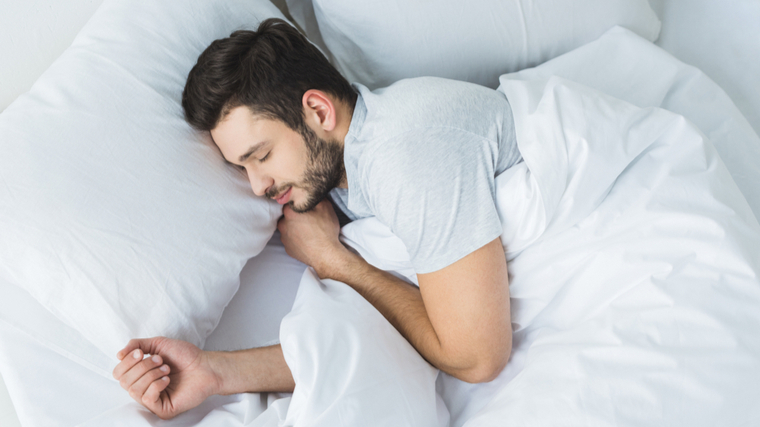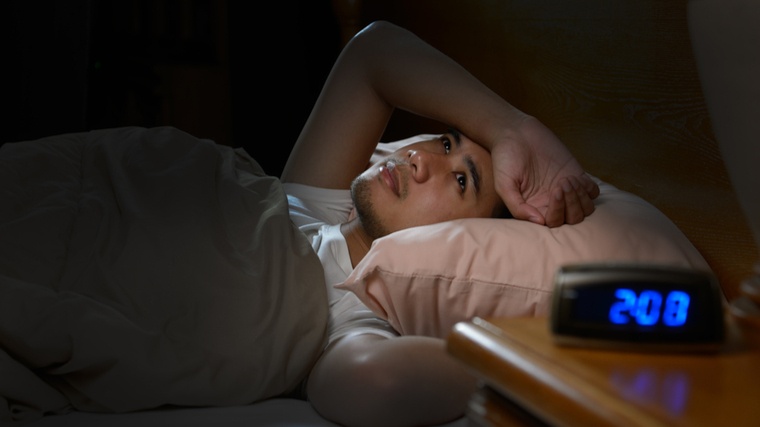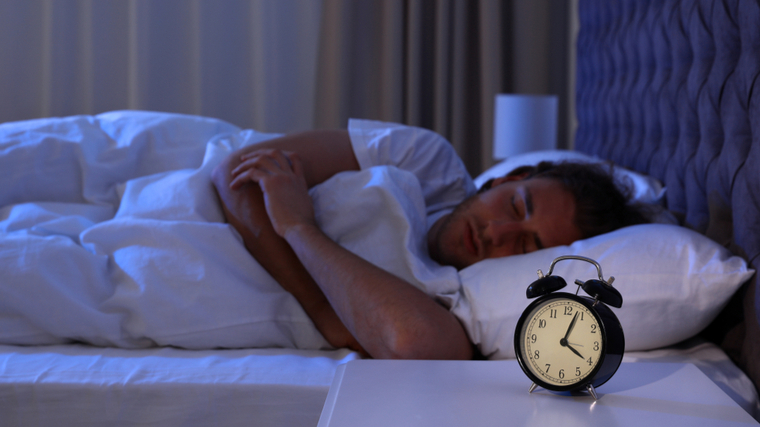The benefits of sleep for performance are no longer in question. You can follow a perfectly calibrated diet, adhere to top-notch programming, and clean out your local GNC building the perfect supplement stack. But if you’re not sleeping enough, you’re cutting yourself off at the knees.
A study published in the journal Sleep, conducted at Stanford University, had 11 basketball players log a minimum of 10 hours of sleep per night for five weeks. After five weeks of optimal rest, the players recorded faster sprint times, a 9% increase in free throw accuracy, and a 9.2% increase in three-pointers made. (21) Sleep is essential for energy, mental health, and longevity. And chances are, you know this. However, it’s not always easy to detach from your phone and tuck yourself in.

Just because you haven’t gotten good sleep before, it doesn’t mean you can’t get good sleep now. Good sleeping habits are just one part of being productive and can help improve your physical and mental health. You make time for eating and socializing — it’s time to make sleep a priority as well.
How Sleep Works
No matter how busy you are, getting enough sleep is essential and can help improve the quality and longevity of your life. Studies suggest that poor sleep is a public health problem, and it has been associated with seven out of the 15 leading causes of death in the United States. According to a 2014 survey done by the Center of Disease Control (CDC), only 65% of adults in the US reported getting enough sleep. (1)(2)
Several factors can influence your body to sleep and to wake up. One of these factors is your circadian rhythm, which is also known as your body’s internal “clock.” It can run on a 24-hour repeating cycle with the demand for sleep growing every hour and peaking in the evening when most people go to sleep. A chemical called adenosine is found to be associated with this demand. The level of adenosine in your brain grows and begins to signal towards sleep. As you sleep, your body breaks down the adenosine.

Your surroundings can also affect how easily you fall asleep or wake up. When light hits your eyes, it signals to your brain that it is daytime. When it’s dark, a sleep-inducing chemical called melatonin is releases. In modern times, using your phone, laptop, or watching TV at night disturbs sleep schedule because the light — known as blue light — of the screen mimics the daytime. (3)
There are two separate kinds of sleep: rapid eye movement (REM) sleep and non-REM sleep. Non-REM sleep occurs in three stages — you’re falling asleep, you are asleep, and then you enter what is called deep sleep, which usually happens about an hour after you fall asleep. During REM sleep, your brain is active and your eyes twitch. This is usually where you’re dreaming, and your muscles become limp. (4)
Risks of Sleep Deprivation
Sleep deprivation or deficiency can have several negative effects on your physical and mental health. Dr. Michael Grandner, Casper Sleep Advisor & Director of the Sleep and Health Research Program at the University of Arizona, states, “People who have poor sleep health die sooner — this is well-established and has been known for over 50 years. Long-term effects of poor sleep health include weight gain and obesity, heart problems, metabolic problems, and more, among a host of short-term adverse effects as well.”
Higher Risk for Cardiovascular Disease
Research suggests that people with poor sleeping habits or insomnia have a 29% higher risk of developing a cardiovascular disease. (5) Compared to just a few years ago, there has been a steady decline in the amount of sleep the average adult is getting, and it can take a toll on your heart health.
Another study suggests that individuals that get five or fewer hours of sleep per night, compared to those that get seven to eight hours, are at a higher risk of hypertension, coronary heart disease, and diabetes mellitus. (6)
[Read More: The Best Fitness Apps]
Weight Gain and Obesity
If you’re eating right and exercising and still not losing weight, it could be because you’re not getting enough sleep. Sleep deprivation, which can be considered getting fewer than seven hours of sleep at night, may have a direct association with weight gain.
Specifically, individuals that slept five hours or less were 32% more likely to gain weight and those who slept six hours or less were 12% more likely to gain weight than those who slept seven to eight hours a night. (7)
[Read More: Best Fat Burners, With Expert Advice from an RD]
Mental Health Problems
Mental health problems, such as depression and anxiety, are increasingly prevalent. In fact, the CDC reported that mental health illness symptoms increased by approximately 5% between 2020 and 2021. (8)
Mental health is still a prominent issue that can be heightened by lack of sleep. Studies suggest that sleep deprivation can cause new mental health issues as well as contribute to any existing ones, and improving sleep habits could positively affect your mood and mental wellbeing. (9)
Decreased Cognitive Performance
Working long hours may affect your sleep schedule, and even though you think you’re being productive, sacrificing sleep may actually be doing the opposite. This could be explained through certain areas of the brain being more vulnerable when sleep deprived.

Studies suggest attentional lapses, or microsleeps, can be caused by sleep deprivation and seem to be the main factor in poor cognitive performance, including language, critical thinking, memory, self-control, and creativity. These microsleeps are described as short periods of “sleep-like electro-encephalography (EEG) activity”. (10)
How to Get Better Sleep
You may have developed poor sleeping habits because of a demanding work schedule, stress, family, children, or noisy neighbors, but that doesn’t mean you have to sleep poorly forever. The first step is understanding how important sleep is. The next step is developing better sleeping habits.
In addition to Grandner, BarBend spoke with Dr. Rebecca Robbins, Ph.D. and Sleep Expert to Oura, about how to secure a more peaceful sleep:
“Healthy sleep tonight, believe it or not, really starts when you wake up in the morning,” says Robbins. “Our other health behaviors throughout the day matter for our sleep. For instance, managing stress throughout the day, making time for exercise, and eating a healthy, balanced diet are all components of your sleep success.”
Proper Exercise and Nutrition
“Exercise can help promote healthy sleep, as can a healthy diet (especially if you don’t eat too close to bedtime),” Grandner says. Exercise tires the body out, and that can contribute to better sleep, but there’s even more to it. Studies suggest exercise can help insomniacs fall asleep faster and even sleep longer. (11)
There are a couple theories as to why this is the case. The first being it can help realign your circadian rhythm. Studies suggest that the circadian rhythm can malfunction when a person’s sleep-wake cycle does not follow the “normal” morning and evening schedule. (12) Exercise may help you fall asleep faster because there’s not many other stimuli that depletes energy or breaks down tissue like strength training or aerobic activities.
The second theory is since mental health and sleep go hand-in-hand, the same goes for exercise and mental health. Studies suggest that exercise can help reduce anxiety, depression, and negative moods, while helping increase self-esteem and social interaction. (13)
The third theory has to do with your body temperature. Your body temperature decreases before you fall asleep, and the same thing can happen after you exercise since your body temperature can rise during this activity. Studies suggest that the similarity between falling asleep and coming down from a workout may help signal your body to sleep. (14)
[Read More: The Best Meal Delivery Services, According to a Dietician]
A consistent workout routine paired with proper nutrition could be the change needed for you to get better sleep. You’ve probably heard of the popular phrase, “you are what you eat,” and it could be truer than you think. Research shows that the hormonal pathways involved in sleep quality and quantity may be affected by diet. (15)
Eating the right food can have positive effects on all aspects of your life, so it’s important to know what those foods are. Studies show that a diet consisting of low fiber, high saturated fat, and sugar can result in poor sleeping habits. (16) More studies show a relationship between short sleep and lacking key nutrients, such as calcium, magnesium, and vitamins A, C, D, and E. (17)
You also want to think about what’s in your cup as well. That cup of coffee in the afternoon or soda with dinner could be affecting your sleep. Grandner says, “caffeine can interfere with sleep as much as 10 to 12 hours after consumption.” Just sticking with one cup of coffee in the morning or substituting that soda for water could make a difference.
Fixing your diet is a lifestyle change, but it could mean a longer, happier, more energetic life. If you’re unaware of where to start with these nutrients, consult with a registered dietician.
Determine a Bedtime
You may have thought bedtimes were just for children, but they’re important for adults too to help maintain healthy sleeping habits. Picking a bedtime and sticking to it can help train your body for better sleep.
“A consistent sleep schedule will allow your brain and body to better understand when you want to sleep and want to be alert,” Robbins says. “Find a time you can fall asleep and wake up most nights of the week and commit to keeping that time (and not varying by more than 1 hour) each day for one full week. Notice if you find yourself after a few days of this consistent sleep schedule falling asleep a bit faster and making waking up a bit more refreshed.”

Irregular bedtimes are a common problem and can be caused by work or school demands, social events, mental health deterioration, and more, and it could be the reason for poor sleep quality. Studies suggest an irregular bedtime can affect your quality of sleep and tiredness and fatigue throughout the day. (18)
“Make sure that you go to bed at the right time. This means giving your mind and body the time and space needed to wind down and prepare for sleep, so that when you get into bed, you are ready. Otherwise, you may be physically uncomfortable or unable to “turn your mind off,” Grandner says.
Sleep In Your Bed
Just one more episode of your favorite show, then you’ll go to bed. Next thing you know, you’re waking up on the couch. It may seem harmless, but not sleeping in your bed could be the reason you’re not sleeping well. It may not be just because of the comfort level either, but your body’s response by being in bed.
Grandner says to “use the bed for sleep and little else. You want the bed to be the place for sleep, so that it can trigger a sleep response, just like how your favorite restaurant triggers a hunger response as soon as you enter. This also means getting out of bed if you cannot sleep.”
Establish a Bedtime Routine
If you don’t have a routine to get you ready for bed, you might want to think about establishing one, especially if you have trouble sleeping.
“Another strategy to make sure you stay on track with your regular, consistent sleep schedule, is starting a relaxing routine before you aim to fall asleep,” says Robbins. “Specifically, you might aim to unplug from electronics and work in the 30 minutes before you aim to fall asleep and start a relaxing bedtime routine, like taking a warm bath or reading for pleasure.”
You may not be able to completely turn off your phone before bed, but at least putting it away could help you sleep better. Research found that approximately 90% of Americans use some kind of electronic device within the hour before bed, and that the more engaging the technology was, the more difficult it was to actually fall asleep and get proper sleep. (19)
Since people are creatures of habit, establishing and sticking to a bedtime routine can help train your body and mind when it’s time to go to bed. This isn’t a new concept though. Some literature shows that a consistent bedtime routine, including baths, massages, cuddling, and lullabies, in infants and toddlers significantly reduced poor sleeping behavior. (20)
Bedtime routines are just as important for children as they are for adults, and they can help our bodies differentiate the night and day, helping make it easier to fall asleep.
Establish a Good Morning Routine
What you do in the morning can also affect how you’re going to sleep, so it’s just as important to establish a routine in the morning as it is at night. “Waking up at the same time every day can help set your body clock for proper sleep and getting morning light and activity can help send a daytime signal to your brain so that you can start your day with as much energy as possible,” says Grandner.
Examples of a morning routine might look like waking up at the same time, eating breakfast, and exercising. It can help you get the day started and help you sleep better at night. Studies suggest that a daily routine can help improve sleep quality as well as help you fall asleep faster. (21)
Keeping consistent is one of the best things you can do for a routine, and going to bed and waking up at the same time can help keep our circadian rhythm in line.
Time to Catch Some Zzz’s
One of the reasons you may not be getting enough sleep is because you see it as unproductive. The phrase “sleep is for the weak” is all too familiar. However, you must push past this mindset and realize that sleeping is a large part of your productivity in the gym, and is a critical part of living a long, healthy life.
Grandner says, “The biggest issues that play into healthy sleeping habits are the limits we set on ourselves. We need to give ourselves permission to get the sleep we need. Although society seems to think that sleep is unproductive time, we know this is wrong. Healthy sleep is an investment in your health, your effectiveness, and your mental well-being. That mindset is key.”
References
- Chattu, Vijay Kumar, Manzar, Md. Dilshad, & Kumary, Soosanna. The Global Problem of Insufficient Sleep and Its Serious Public Health Implications. Healthcare (Basel). 2019; 7(1). doi: 10.3390/healthcare7010001
- Centers for Disease Control and Prevention. (2017, May 2) Sleep and Sleep Disorders. CDC. https://www.cdc.gov/sleep/data_statistics.html
- National Heart, Lung, and Blood Institute. Sleep Deprivation and Deficiency. US Department of Health and Human Services. https://www.nhlbi.nih.gov/health-topics/sleep-deprivation-and-deficiency
- National Heart, Lung, and Blood Institute. How Sleep Works. US Department of Health and Human Services. https://www.nhlbi.nih.gov/health-topics/how-sleep-works
- Nagai, Michiaki, Hoshide, Satoshi, Kario, Kazuomi. Sleep Duration as a Risk Factor for Cardiovascular Disease- a Review of the Recent Literature. Current Cardiology Reviews. 2010; 6(1). doi: 10.2174/157340310790231635
- Cooper, Christopher B, Neufeld, Eric V, & Dolezal, Brett A. Sleep deprivation and obesity in adults: a brief narrative review. BMJ Open Sport & Exercise Medicine. 2018; 4(1). doi: 10.1136/bmjsem-2018-000392
- Vahratian, Anjel, Blumberg, Stephen J., & Terlizzi, Emily P. Symptoms of Anxiety or Depressive Disorder and Use of Mental Health Care Among Adults During the COVID-19 Pandemic — United States, August 2020–February 2021. Centers for Disease Control and Prevention. 2021; 70(13).
- Scott, Alexander J, Webb, Thomas L, Rowse, Georgina. Does improving sleep lead to better mental health? A protocol for a meta-analytic review of randomised controlled trials. BMJ Open. 2017; 7(9). doi: 10.1136/bmjopen-2017-016873
- Alhola, Paula, Polo-Kantola, Paivi. Sleep deprivation: Impact on cognitive performance. Neuropsychiatric Disease and Treatment. 2007; 3(5).
- Passos, Giselle Soares, Poyares, Dalva Lucia Rollemburg, & Santana, Marcos Goncalves. Is exercise an alternative treatment for chronic insomnia? Clinics. 2012; 67(6). doi: 10.6061/clinics/2012(06)17
- Baron, Kelly Glazer, Reid, Kathryn J. Circadian Misalignment and Health. Int Rev Psychiatry. 2014; 26(2). doi: 10.3109/09540261.2014.911149
- Sharma, Ashish, Madaan, Vishal, Petty, Frederick D. Exercise for Mental Health. The Primary Care Companion to the Journal of Clinical Psychiatry. 2008; 8(2). doi: 10.4088/pcc.v08n0208a
- Horne, J A. Exercise and sleep: body-heating effects. Sleep. 1983; 6(1). DOI: 10.1093/sleep/6.1.36
- Frank, Sarah, Gonzalez, Kelli, & Lee-Ang, Lorraine. Diet and Sleep Physiology: Public Health and Clinical Implications. Frontiers in Neurology. 2017; 11(8). doi: 10.3389/fneur.2017.00393
- St-Onge, Marie-Pierre, Roberts, Amy, & Shecter, Ari. Fiber and Saturated Fat Are Associated with Sleep Arousals and Slow Wave Sleep. Journal of Clinical Sleep Medicine. 2016; 12(1). doi: 10.5664/jcsm.5384
- Iknote, Chioma J, Mun, Jonathan G, & Reider, Carroll A. Micronutrient Inadequacy in Short Sleep: Analysis of the NHANES 2005–2016. Nutrients. 2019; 11(10). doi: 10.3390/nu11102335
- Kang, Jiunn-Horng, Chen, Shih-Ching. Effects of an irregular bedtime schedule on sleep quality, daytime sleepiness, and fatigue among university students in Taiwan. BMC Public Health. 2009; 9. doi: 10.1186/1471-2458-9-248
- Grandner, Michael A. Sleep, Health, and Society. Sleep Med Clin. 2017; 12(1). doi: 10.1016/j.jsmc.2016.10.012
- Mindell, Jodi A, Telofksi, Lorena S, & Wiegand, Benjamin. A Nightly Bedtime Routine: Impact on Sleep in Young Children and Maternal Mood. Sleep. 2009; 32(5). doi: 10.1093/sleep/32.5.599
- Zisberg, Anna, Gur-Yaish, Nurit, Shochat, Tamar. Contribution of Routine to Sleep Quality in Community Elderly. Sleep. 2010; 33(4). doi: 10.1093/sleep/33.4.509
- Leproult R, Van Cauter E. Effect of 1 week of sleep restriction on testosterone levels in young healthy men. JAMA. 2011;305(21):2173-2174. doi:10.1001/jama.2011.710
Featured Image: Rido / Shutterstock